 previous article in this issue previous article in this issue | next article in this issue  |

Preview first page |
Document Details : Title: The Semantic Shift of נשא פנים and בשת in Ben Sira in its Hellenistic Context Author(s): DARSHAN, Guy Journal: Biblica Volume: 100 Issue: 2 Date: 2019 Pages: 173-186 DOI: 10.2143/BIB.100.2.3286597 Abstract : In two cases, Ben Sira deals with the ambivalence of shame: 4,21-24 and 41,14–42,8. There are cases in which shame is negative and brings about bad things, and there are cases in which shame is desirable and good. While the negative sense of shame is the common meaning in Biblical Hebrew, the positive sense may belong to the Hellenistic period. In these two pericopes the meaning of the expression נשא פנים, which parallels the verb בוש (Sir 4,22; 42,1), seems also to have undergone a semantic shift, but its exact meaning is disputed. This essay suggests a solution to the dispute regarding the expression נשא פנים by tracing its translational tradition in the Septuagint, and by examining the related expression הכיר פנים. A novel approach is adopted in interpreting these passages, using the Septuagint as a dictionary for the Hebrew of the Hellenistic period. In order to understand the semantic development of both this expression and the concept of shame in general during the Hellenistic period, the second part of the paper draws attention to the ambivalence of the concept of shame in Greek literature. This data may shed new light on the reason for the semantic shift of these terms in Ben Sira’s time. Furthermore, this may also contribute to the expanding discussion of Jewish wisdom literature from the Hellenistic period against the background of its time and place. |
|


